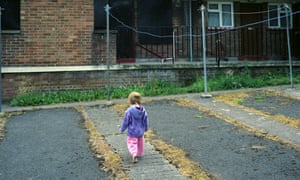
Extreme poverty – where families are routinely unable to afford regular meals, wash clothes or provide their children with basic items such as beds and sheets – is becoming more common, according to frontline family support workers.
Three-quarters of support professionals such as health visitors and social workers said they had seen an increase in the numbers of families they regularly worked with who experienced destitution and were in need of basic financial support.
Despite more families facing greater difficulties, official support was harder to come by, the survey found. “The only substantive increase in support over the last year was the increase in the number of families support workers have seen using food banks,” it read.
The survey of 1,290 frontline family support workers from 616 organisations across the UK was published by the poverty grants charity Buttle UK. It said it was undertaken to provide a “thermometer reading” of the lives of some the UK’s most vulnerable families.
It comes amid rising concern that alongside headline increases in relative poverty in recent years – more than 4 million children in the UK live below the breadline – a cohort of the very poorest families is experiencing the extreme and intractable form of poverty known as destitution.
Destitution is defined as experience of at least two of six measures over the previous month, including eating fewer than two meals a day for two or more days; or as a weekly income after housing costs of £70 for a single adult or £140 for a couple with children – an amount below which people “cannot meet their core material needs for basic physiological functioning from their own resources”.
Last week, the MPs Frank Field and Heidi Allen warned that austerity cuts meant that the poorest communities were now “blighted by the constant spectre of destitution”. An estimated 1.5 million people in the UK, including 350,00 children, experienced destitution in 2017.
Joseph Howes, Buttle UK’s chief executive, said that although the charity was used to working with families with very little, they had been shocked by the scale and extent of the deprivation. “Make no mistake, this report shows that there are real individuals behind the statistics who are struggling on a day-to-day basis in the UK.”
Commonly seen examples of poverty reported in the survey included food insecurity, inability to afford basic needs such as heating and bedding, no internet access, and the absence of family breaks, holidays and free activities. “Often families do not even have the bus fare to travel to the food bank,” one respondent said.
Although paid work is a recognised route out of poverty, half of those surveyed said they regularly worked with families where one or even two adults were in insecure or low-paid employment and still did not earn enough to make ends meet.
Practically all respondents (99%) said they sometimes or often worked with families who had run up personal debts and struggled financially because of universal credit payment delays or other benefit cuts. About 40% said state-funded crisis support through local welfare schemes had declined.
Violence was a presence in the lives of the poorest families, with 85% of respondents saying they worked with families who witnessed violent crime. Nearly all said they worked with families affected by domestic violence.
Buttle UK gave out £4.6m in individual targeted grants to UK families in poverty in 2017-18, supporting more than 35,000 children and young people. The grants pay for items such as fridges, washing machines, baby equipment, clothing and bedding. Its network of 10,000 frontline family support workers refers families for grants.
A government spokesperson said: “National statistics show that severe poverty has not been rapidly increasing, and this has been confirmed by the Institute for Fiscal Studies, which has found that severe poverty has declined in recent years.”
[“source=theguardian”]











